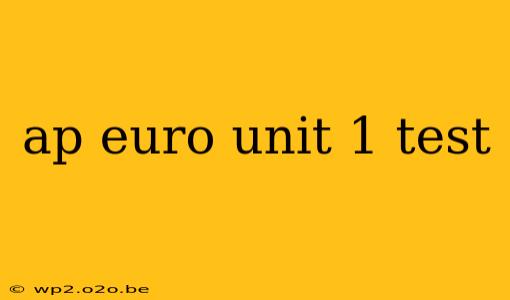Conquering Your AP Euro Unit 1 Test: A Comprehensive Guide
The AP European History Unit 1 test looms large, covering a period brimming with significant events and complex historical shifts. This guide will equip you with strategies to not only pass but to excel, transforming the daunting task into a manageable and even rewarding experience. We'll break down key themes, effective study techniques, and provide insights into what examiners look for.
Understanding the Scope of Unit 1: The Renaissance and Reformation
AP Euro Unit 1 typically focuses on the Renaissance and the Reformation. This period witnessed a dramatic transformation of European society, impacting art, religion, politics, and economics. Understanding the interconnectedness of these changes is crucial for success. Key areas to master include:
-
The Italian Renaissance: Explore the flourishing of art, literature, and intellectual thought in Italian city-states. Key figures like Leonardo da Vinci, Michelangelo, and Machiavelli should be familiar. Analyze the humanist movement and its impact on philosophy and education. Don't just memorize names—understand why these individuals were significant and how they reflect broader societal shifts.
-
The Northern Renaissance: Contrast the Italian Renaissance with the Northern Renaissance, noting its unique characteristics and key figures such as Erasmus and Thomas More. Consider the role of the printing press in disseminating new ideas and fostering intellectual exchange.
-
The Protestant Reformation: This is a cornerstone of Unit 1. Understand Martin Luther's Ninety-Five Theses and their impact. Analyze the role of key figures like John Calvin and Henry VIII. Explore the political and social consequences of the Reformation, including the rise of religious wars and the weakening of papal authority. Consider the impact on different regions of Europe—was the Reformation's experience the same in England as in Germany?
-
The Catholic Reformation (Counter-Reformation): This crucial response to the Protestant Reformation saw the Catholic Church implement reforms and strengthen its position. Familiarize yourself with the Council of Trent and the activities of the Jesuits. Understanding the Catholic response is essential for a nuanced understanding of the entire period.
Effective Study Strategies for AP Euro Unit 1
Beyond Rote Memorization: Simply memorizing names and dates will only get you so far. Focus on understanding cause-and-effect relationships. Ask yourself: Why did the Reformation happen? What were the consequences? How did the Renaissance influence later historical developments?
Active Recall Techniques: Employ active recall methods, such as the following:
- Flashcards: Create flashcards that focus on concepts and their interconnectedness, not just isolated facts.
- Practice Questions: Utilize practice tests and questions from your textbook or online resources. Analyze your mistakes to identify areas needing further study.
- Outlining and Summarizing: Create outlines of key chapters and summarize complex concepts in your own words. This will strengthen your understanding and improve your ability to explain the material concisely.
- Group Study: Discussing concepts with peers can clarify confusing ideas and provide different perspectives.
Connecting the Dots: One of the most challenging aspects of AP European History is weaving together seemingly disparate events and figures. Focus on the overarching themes and how they interconnect. For instance, how did the Renaissance's emphasis on humanism influence the Reformation's challenges to papal authority?
What Examiners Look For:
AP graders value nuanced arguments, historical contextualization, and the ability to analyze primary and secondary sources critically. Make sure your essays demonstrate a deep understanding of the material and avoid generalizations. Support your arguments with specific evidence and thoughtful analysis.
By focusing on understanding the underlying themes, utilizing effective study strategies, and practicing critical analysis, you can confidently approach your AP Euro Unit 1 test and achieve your desired score. Remember that consistent effort and a clear understanding of the material are key to success. Good luck!

